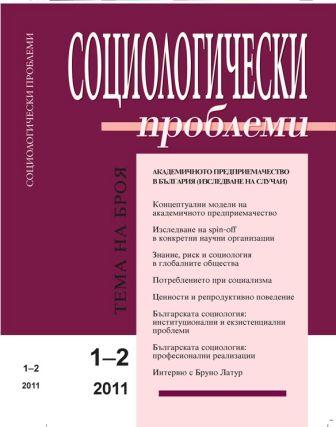Академичният spin-off като двигател на икономическа трансформация в Източна Европа (теоретичен анализ)
Academic Spin-off as an Engine of Economic Transformation in East Europe (a Theoretical Analysis)
Author(s): Ivan Tchalakov, Tihomir Mitev, Venelin PetrovSubject(s): Social Sciences
Published by: Институт по философия и социология при БАН
Summary/Abstract: The article questions some of the preconditions of academic spin-offs often assumed in studies on this topic; the authors assert that when these preconditions are considered to be characteristics of the academic spin-off per se, they are of little use for understanding this phenomenon in the countries of East Europe during the transitional and post-transitional periods after 1989. The authors argue the need for applying a path-dependent approach that takes into account the institutional and organizational specificities of local economies, political regimes, research systems, their evolution, etc., all of which have a strong impact on spin-off activities. The article presents some new findings and arguments in support of the seminal thesis of Katalin Balázs regarding the emergence of academic spin-offs in the early stages of the transition (Balázs 1995; 1996). The article shows some key economic and political mechanisms related to academic entrepreneurship in East Europe, such as the tension between the economic and political nomenklatura of the former communist parties, and the fact that, depending on whether the power of the political nomenklatura was preserved or abolished, different paths of development ensued: quick reforms in the countries that acceded to the EU in the „first wave“, or the establishment of rent-seeking type economies that drained the industrial assets in countries like Bulgaria and Romania. In the latter type of economy a specific economic situation arose, unknown in West Europe and the so-called „champion countries“ of the transition: suppression of authentic entrepreneurship in many sectors of the economy, fragmentation of corporative structures, etc. The article displays the common background of the two opposite trends in the development of post-socialist academic spin-off, partially described in other studies (Simeonova 1996; Pavlova 2000): on one hand, the emergence of authentic academic entrepreneurship that captures the opportunities arising from the economic crisis and that compensates for the failures in policies on science and technology, and, on the other hand, the emergence of specific rent-seeking strategies among some scientists and engineers, which leads to the destruction of valuable public assets (resulting in increased negative attitudes among local academic circles towards academic entrepreneurship in general). The article introduces some new discoveries regarding the evolution of academic spin-off in Bulgaria in the context of these two opposite trends, as well as the positive and negative effects of spin-off activities upon the parent institutions from which they came.
Journal: Социологически проблеми
- Issue Year: 43/2011
- Issue No: 1-2
- Page Range: 7-44
- Page Count: 38
- Language: Bulgarian
- Content File-PDF

